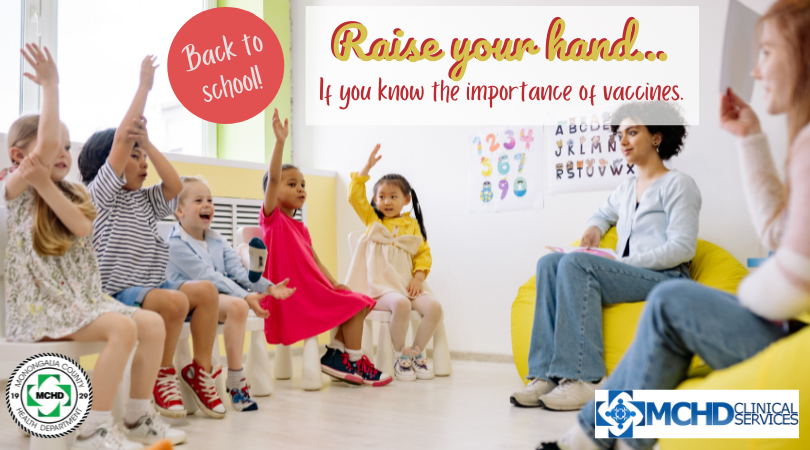It's time to make plans for back-to-school vaccines

Jul. 20, 2021
By Mary Wade Burnside
Returning to school this fall should look a lot different than last year.
Schools are due to be open and thanks to the variety of COVID-19 vaccines available, including Pfizer’s that has been approved for ages 12 and up, that’s going to be safer than in-person classes were last year.
But parents also should remember that their children need to get other vaccines in order to be healthy, keep their fellow students safe and comply with West Virginia law.
Children still need to be protected against vaccine-preventable diseases such as measles, chickenpox, pertussis and diphtheria.
August is National Immunization Awareness Month. As has become strikingly clear during the past 17 months, vaccines are a vital tool in the public health toolbox.
Diseases such as polio and smallpox have been eliminated in the United States, and a resurgence of measles outbreaks a couple of years ago illustrated what can happen when individuals let down their guard when it comes to inoculations.
And, of course, the COVID-19 pandemic is a great example of how cases and deaths lowered dramatically once vaccines ramped up — and also how once a new and dangerous variant popped up, those who remain unvaccinated became the ones suffering the most.
The Centers for Disease Control and Prevention has information on vaccines needed at every stage of life, including children, teens, adults, pregnant women and travelers.
Because it’s time for students to get their back-to-school vaccines, we’re focusing on kids who are around ages 5 through early adulthood.
Here are just a couple of examples why vaccines are important.
It seems like a long time ago, but let’s not forget that in October 2019, there was concern about a case of hepatitis A in a food worker at an area restaurant. Monongalia County Health Department worked to vaccinate individuals who had eaten there during a certain window of time.
And again, there’s the measles. Previously considered eliminated in the United States since 2000, a 2019 outbreak resulted in 1,282 cases in the United States in 2019. The CDC reported 13 cases in 2020 and two so far in 2021. Because of West Virginia’s strict vaccination laws, none of these cases took place in West Virginia.
The CDC offers an easy-to-read guide on vaccinations that babies should receive from infanthood to the age of 6. These are the mandated vaccines that the state of West Virginia requires students to get in order to attend public school.
For children who have been vaccinated according to the current schedule, here is a list provided by the CDC of recommended vaccines for students between the ages of 7 and 18:
• All preteens and teens need a flu vaccine every year. Some children 6 months through 8 years of age require two doses of flu vaccine. Children 6 months through 8 years getting vaccinated for the first time, and those who have only previously gotten one dose of vaccine, should get two doses of vaccine this season. The first dose should be taken as soon as the flu vaccine is available, and the second dose should be received at least 28 days after the first dose. In following years, only one dose is needed. Flu vaccines are always important, but vitally so now.
In addition to an annual flu vaccine, three vaccines are recommended specifically for preteens:
• HPV vaccine protects against HPV infections that can cause cancer later in life, including that of the cervix, for which women can be routinely screened, as well as mouth/throat, anus/rectum, penis, vagina or vulva, for which people are not routinely screened.
• Tdap is a booster shot to help protect preteens from whooping cough, tetanus and diphtheria. Tdap not only protects the child from these diseases, but also keeps them from giving whooping cough to a young baby who does not have immunity yet.
• Meningococcal conjugate vaccine protects against meningitis and bloodstream infections (bacteremia or septicemia). These illnesses can be very serious, even fatal.
MCHD Clinical Services has made some changes in order to be as safe as possible during the pandemic. Forms are sent online the day prior to the appointment, and when you arrive, you can call from your phone to alert us that you’re here. You will be registered and payment will be taken over the phone. Then your temperature will be taken at the entrance. Patients should go to the upper level to the front door.
If you haven’t gotten your child vaccinated yet, there is still time. Call your health care provider. Or make an appointment at Monongalia County Health Department’s Clinical Services at 304-598-5119.
Mary Wade Burnside is the public information officer at Monongalia County Health Department.